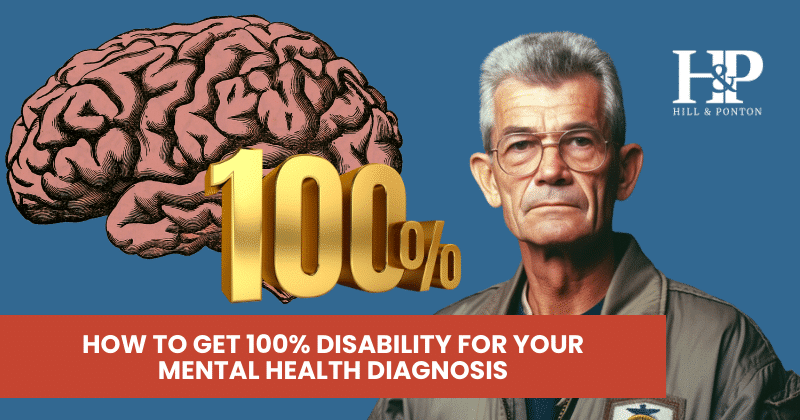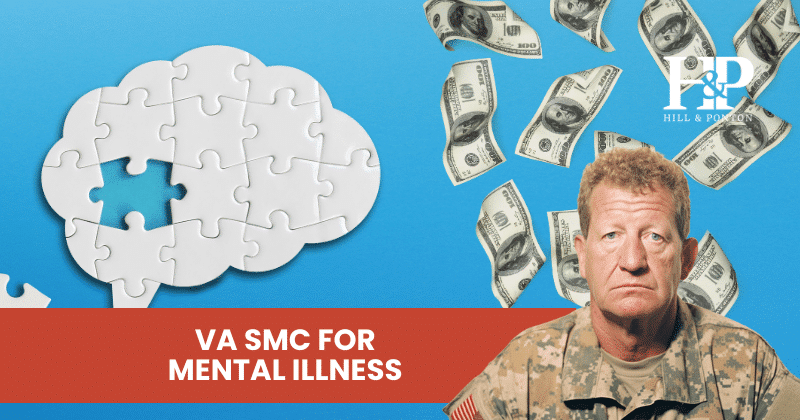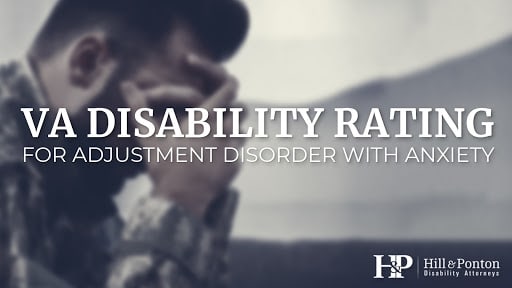Mental health disorders are a common issue among veterans who have experienced traumatic events during their military service.
The Department of Veterans Affairs (VA) recognizes that these conditions can have a significant impact on a veteran’s life, including their ability to work, maintain relationships, and engage in daily activities.
For this reason, the VA offers disability compensation for veterans who have service-connected mental health disabilities.
Some mental health conditions can qualify for a 100% disability rating from the VA. A veteran can receive a 100% disability rating if they experience severe symptoms that significantly impact their ability to work or perform daily activities.
This means that veterans with these conditions may be eligible for the highest amount of compensation possible.
These conditions include:
- Post-traumatic stress disorder (PTSD): PTSD is a mental health disorder that can develop after a person experiences or witnesses a traumatic event. Symptoms may include flashbacks, nightmares, avoidance of triggers, and hyperarousal. Major depressive disorder: Major depressive disorder is a mental health condition characterized by persistent feelings of sadness or hopelessness, loss of interest in activities, changes in appetite or sleep, and difficulty concentrating.
- Depression: Depression is a very common mental health disorder diagnosed both in the veteran population, as well as the general public. It is characterized by excessive periods of overwhelming sadness and grief, and is usually treated by way of medications and therapy.
- Schizophrenia: Schizophrenia is a mental health disorder characterized by delusions, hallucinations, disordered thinking and speech, and lack of motivation.
- Bipolar disorder: Bipolar disorder is a mental health condition characterized by episodes of depression and mania or hypomania. Symptoms may include changes in mood, energy, sleep, and behavior.
- Traumatic brain injury (TBI): TBI is a condition caused by a blow or jolt to the head that disrupts normal brain function. Symptoms may include headaches, dizziness, memory problems, and changes in mood or behavior.
- Obsessive-Compulsive Disorder (OCD): OCD is a condition characterized by intrusive, distressing, and persistent thoughts or obsessions, which are typically followed by repetitive behaviors or compulsions aimed at reducing anxiety. Symptoms may include compulsive hand washing, counting, and checking.
In this blog post, we’ll be discussing how veterans with certain mental health conditions can qualify for a 100% disability rating from the Department of Veterans Affairs (VA).
Obtaining a 100% disability rating can provide significant financial assistance and access to additional benefits and services for veterans who have been impacted by these conditions.
We’ll explore the conditions that can qualify for a 100% disability rating, the steps veterans can take to apply for and potentially receive a high rating, and the importance of receiving an accurate rating that reflects the severity of the condition and its impact on the veteran’s life.
Qualifying for 100% VA Disability Benefits
Qualifying for 100% VA disability benefits requires meeting specific criteria set by the Department of Veterans Affairs (VA).
The VA assigns disability ratings based on the severity of a veteran’s service-connected condition, with ratings ranging from 0% to 100%.
A rating of 100% indicates that the veteran’s condition is considered totally disabling, and they are eligible for the maximum amount of benefits available.
To qualify for 100% VA disability benefits, a veteran must have a service-connected disability or combination of disabilities that result in total occupational and social impairment.
This means that the condition must significantly impact the veteran’s ability to work and perform daily activities, as well as their social interactions and relationships.
The VA may consider medical records, treatment records, and statements from the veteran, as well as any relevant evidence from family members, friends, or coworkers when determining whether a veteran meets this criterion.
The VA may also consider non-service-connected conditions when evaluating a veteran’s eligibility for disability benefits.
For example, a veteran with a service-connected disability that causes severe depression or anxiety may also be evaluated for a non-service-connected mental health condition that contributes to their total impairment.
How to Apply for 100 Percent VA Disability Benefits for Mental Health Conditions
By understanding the VA disability claims process and the qualifications for a high rating, veterans can successfully navigate the system and obtain the compensation and support they deserve.
Here are some of the steps necessary to apply for 100% VA disability benefits:
- Seek medical attention: The first step is to seek medical attention for the mental health disorder. A diagnosis from a licensed healthcare provider is required to establish service connection for the condition and qualify for VA disability compensation.
- Gather medical evidence: Once a diagnosis has been made, gather all medical evidence that supports the diagnosis, including documentation of symptoms, treatments, and medications.
- Complete VA disability claim application: Complete and submit an application for VA disability benefits. This can be done online through the VA’s eBenefits website or by submitting a paper application.
- Attend VA medical exam (C&P exam): The VA may require the veteran to attend a medical examination to evaluate the severity of the condition and the impact it has on the veteran’s daily life.
- Await decision: After submitting the application and attending any required medical exams, the VA will review the evidence and make a decision on the veteran’s disability claim.
- Appeal if necessary: If the veteran disagrees with the VA’s decision, they have the right to appeal the decision and provide additional evidence to support their claim.
Benefits the VA Provides for Veterans with Mental Health Diagnosis’
The VA provides a variety of benefits to veterans suffering with mental health diagnosis’ including the following:
- VA Disability Compensation: Veterans with a service-connected mental health disorder can receive disability compensation to help cover the costs of their treatment and to support them financially.
- VA Healthcare: The VA provides healthcare services to veterans, including mental health services such as counseling and therapy.
- VA Caregiver Support: The VA provides support for caregivers of veterans with mental health disorders, including education, training, and respite care.
- Vocational Rehabilitation and Employment (VR&E): Veterans with a service-connected mental health disorder may be eligible for vocational rehabilitation and employment services to help them find and maintain employment.
- Housing Assistance: The VA offers a variety of housing assistance programs for veterans with mental health disorders, including homeless prevention programs, housing vouchers, and transitional housing.
- Education and Training: The VA offers education and training programs to help veterans with mental health disorders improve their skills and increase their employability.
- Peer Support: The VA provides peer support programs to help veterans with mental health disorders connect with other veterans who have similar experiences.
Secondary service-connected mental health conditions are more common than you think
When a veteran receives a service-connected disability rating for a primary condition, it is possible for them to receive an additional rating for a secondary condition that arises as a result of the primary condition.
This is called being “connected” for a secondary service-connected condition.
This can be particularly important when it comes to mental health conditions, as primary conditions such as physical injuries or chronic illnesses can often cause mental health issues such as depression, anxiety, or post-traumatic stress disorder (PTSD).
For example, a veteran who suffers from chronic pain as a result of a service-connected physical injury may experience depression and anxiety as a result of their condition.
In this case, they may be able to receive a secondary service-connected rating for their mental health condition.
Similarly, a veteran who develops PTSD as a result of combat trauma may also experience physical symptoms such as chronic pain or migraines as a result of their condition, and may be able to receive a secondary service-connected rating for those conditions as well.
It is important to note that the secondary condition must be directly caused by the primary condition in order for it to be considered service-connected.
This means that there must be a clear and direct connection between the two conditions, and that medical evidence must support the claim.
The VA will consider a variety of factors when evaluating a claim for a secondary service-connected condition, including:
- the severity of the primary condition
- the timing and onset of the secondary condition
- any medical evidence or documentation that supports the claim.
In conclusion, receiving a 100% VA disability rating can provide significant benefits and support for veterans who have service-connected disabilities that significantly impact their ability to work and perform daily activities.
While the process of applying for disability benefits can be complex and challenging, understanding the criteria for qualifying for a 100% rating can help veterans and their families navigate the process more effectively.
By working with a VA-accredited representative or attorney and providing comprehensive documentation and evidence of their condition and its impact, veterans can increase their chances of receiving the maximum benefits available to them.
Ultimately, the goal of the VA disability benefits program is to ensure that veterans receive the care and support they need to live healthy, fulfilling lives after their service to our country.
How do you increase a mental health rating to 100% VA Disability Rating?
If you believe the severity of your condition may entitle you to a higher rating, you can file an appeal (within one year of your rating decision), or file a new claim to increase your rating.
You can also file a claim for a secondary service condition if you later developed any conditions or symptoms as a result of other service-connected disabilities, which could also increase your combined disability rating.
If you are interested in learning more about filing for disability benefits, check out our FREE ebook The Road to VA Compensation Benefits.





